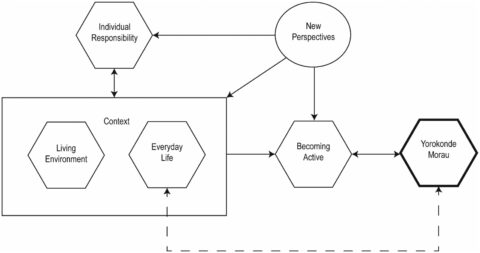Open access article explains well-being experience of making others happy
 A new journal article by DIJ anthropologist Sebastian Polak-Rottmann and DIJ alumnus Dionyssios Askitis (Vienna University) introduces yorokonde morau (making others happy) as a novel concept of well-being originating from lay discourse on happiness in Japan. Their article “Yorokonde Morau: the shared well-being experience of making others happy (and feeling happy because of it)” was published open access in the summer issue of the Social Science Japan Journal. The study explains yorokonde morau as an interactive and reciprocal understanding of well-being. The concept is the outcome of a mixed-methods research project focusing on the ‘positive feedback loop’ of reciprocal well-being observed in high-trust communities. Combining qualitative and quantitative findings, the authors found that the reciprocal experience of yorokonde morau is characterized less by negative social capital and more strongly linked to generalized trust in others than interdependent happiness. Grounded in the real-life experiences of everyday Japanese people, this approach represents a new reciprocal facet of sociocentric well-being.
A new journal article by DIJ anthropologist Sebastian Polak-Rottmann and DIJ alumnus Dionyssios Askitis (Vienna University) introduces yorokonde morau (making others happy) as a novel concept of well-being originating from lay discourse on happiness in Japan. Their article “Yorokonde Morau: the shared well-being experience of making others happy (and feeling happy because of it)” was published open access in the summer issue of the Social Science Japan Journal. The study explains yorokonde morau as an interactive and reciprocal understanding of well-being. The concept is the outcome of a mixed-methods research project focusing on the ‘positive feedback loop’ of reciprocal well-being observed in high-trust communities. Combining qualitative and quantitative findings, the authors found that the reciprocal experience of yorokonde morau is characterized less by negative social capital and more strongly linked to generalized trust in others than interdependent happiness. Grounded in the real-life experiences of everyday Japanese people, this approach represents a new reciprocal facet of sociocentric well-being.